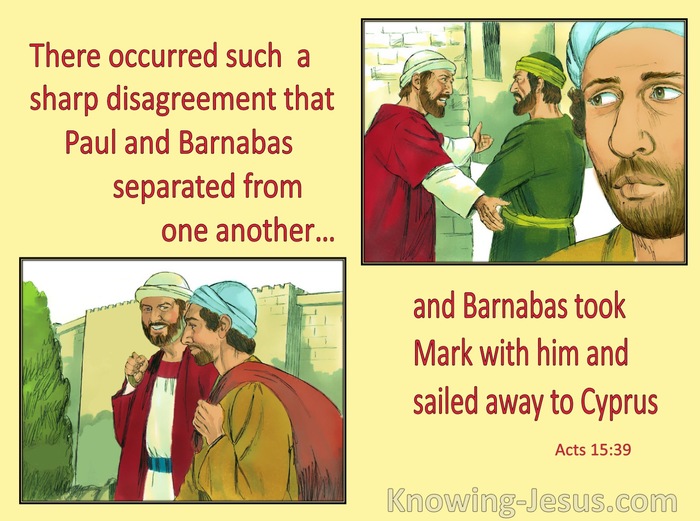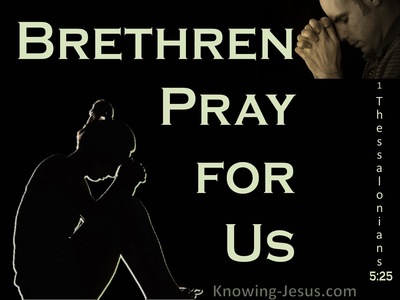◄ What Does Acts 15:39 Mean? ►
And there occurred such a sharp disagreement that they separated from one another, and Barnabas took Mark with him and sailed away to Cyprus.
Acts 15:39(NASB)
Verse of the Day
Much as we gravitate towards teachings about humility and reconciliation, brotherly love, Christian unity, and God's 'golden rule', we are all fallen creatures and too often Christians whiplash their souls through petty arguments, unnecessary contentions, bitterness of spirit, or an attitude of self-righteous pride. Too often, Christian brothers and sisters permit their personal feelings and a touch of spiritual pride to fan a flame of disagreement with other members of the Church which results in broken fellowship or a split within the Body of Christ.
This is not isolated to our own time or unique to any particular Christian community or denomination. Examples of contentious behaviour and broken fellowship can be discovered throughout Scripture - sometimes in the lives of those we label 'spiritual giants' or godly people who were used greatly by the Lord. The Bible does not seek to cover up the character flaws of such individuals or whitewash their disagreements but often exposes them, for our learning, so that we may do the good, reject evil, gain wisdom, and grow in the grace and knowledge of the Lord Jesus Christ.
In Acts 15, we read of a serious disagreement that blew up between Paul - who was a chosen vessel of Christ, and Barnabas - who is often called 'son of reconciliation' or described as 'a man of encouragement and consolation'. Paul and Barnabas had been called apart and separated by the Holy Ghost for a particular work of evangelism and they were greatly blessed on their missionary journey.
It was as they prepared themselves to embark upon their second ministry trip that "the contention between Paul and Barnabas was so sharp, that they departed from one another... and so Barnabas took Mark, and sailed unto Cyprus," while Paul continued his missionary journey with another evangelist, called Silas.
In this passage, we read of two high-profile, apostolic teachers in the early Christian Church who ministered together with great success, but estranged themselves from one another because of an irreconcilable disagreement. Paul purposed to go with Barnabas to revisit the churches they had established on their first missionary journey, but refused to allow a young man called John Mark to join their forthcoming expedition to Syria and Cilicia because he had departed from an earlier mission trip to Pamphylia. Paul considered that someone who had abandoned them in an earlier ministry could not be trusted to join their company again and would not consent, while Barnabas refused to continue his ministry with Paul if John Mark was not permitted to accompany them.
Whether the disagreement between these two ministers of the Gospel was justified or not is unclear in the text, but it is a stark reminder that seemingly inconsequential matters, personal feelings, or strong opinions can become a stumbling block between Christian brothers. Such disagreements may mar their Christian witness or may cause division within the Body of Christ.
Whether the hasty decisions made by Paul and the inflexible attitude of Barnabus were guided by the Spirit or the flesh, is not the real issue at hand. It was not included in Scripture so that we could criticise their behaviour, but learn the lesson God would teach us through this setback. This occurrence was not included in Scripture so that we can point a finger of accusation at these two servants of the Lord. Indeed, we see that despite any impetuous decisions or any heated exchanges, both men continued to be used greatly by God, and shared the gospel to a greater number of lost souls throughout Asia... as Paul and Silas journeyed to Syria to strengthen the Churches there, and Barnabas and John Mark set off to take the gospel to Cyprus and beyond.
As we reflect on this passage, we see how God works all things together for good for those that love Him, even when certain decisions we make are influenced by our own fleshly passion or strongly held principles. While Paul and Barnabas never worked together in ministry again, their disagreements were resolved in later years and John Mark, who angered Paul by departing from their first missionary journey, was used by God to pen the glorious Gospel of Mark.
As we consider this passage, we are reminded that God's work will not be halted by any hasty decisions we choose to make or by our over-enthusiastic zeal and that, in His grace, God will often turn potential evil into lasting good. How important, also, to recognise the wisdom of maintaining the unity in the spirit in the bond of peace and preserving harmony in the Body of Christ. It was some years later in his letter to the Ephesians that Paul wrote, "Endeavour to keep the unity of the Spirit in the bond of peace." Similarly, he encouraged the Roman church to consider others before themselves and wrote, "If possible, so far as it depends on you, be at peace with all men." And in his final letter to Timothy, from a Roman jail, we see Paul's change of attitude toward John Mark, when he wrote, "Bring Mark with you, for he is useful to me in the ministry."
I wonder, as Paul reflected on his life and ministry, whether the instructions he gave in his later epistles were influenced by his sharp disagreement with Barnabas and his stark refusal to allow John Mark to accompany them. May we learn all that the Lord would teach us through this passage and seek to walk in spirit and truth in every decision we make, for His praise and glory.
My Prayer
Heavenly Father, how it must grieve You when there are sharp divisions and splits in the Body of Christ. I pray that I would walk all my days in spirit and truth, in unity with my brethren. Lord, give me boldness to call out ungodly behaviour, and give me humility to accept criticism, when given in truth, in love, and to Your praise and glory. The enemy seeks to kill and destroy. I pray I will not give the enemy a foothold in my life, but as Paul states in Romans, "If it is possible, as far as it depends on you, live at peace with everyone." In Jesus' name, AMEN.
Choose a Verse from Acts 15
Acts 15:39 Further Study
- Acts 15:39 in the Parallel Bible
- Acts 15:39 in the Thematic Bible
- Acts 15:39 Cross References
- Acts 15:39 Treasury of Scripture Knowing
- Acts 15:39 Sermons
- Acts 15:39 Prayers
- Acts 15:39 Images
- Choose Chapter
Never miss a post














